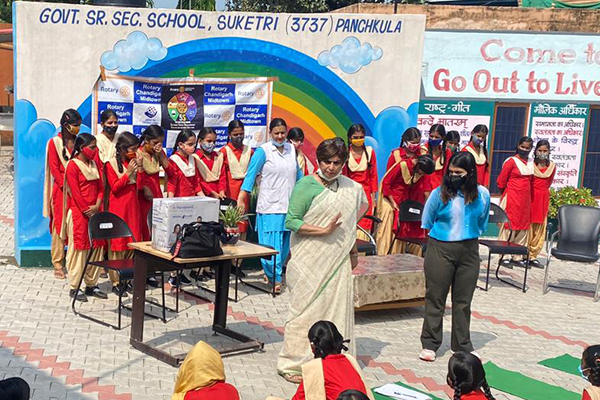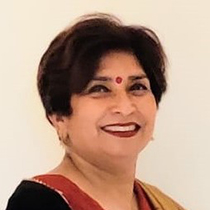

By Dr. Rita Kalra, Rotary Club of Chandigarh Midtown, Haryana, India, and a member of the Rotary Foundation Cadre of Technical Advisors
I have had the good fortune of leading an incredible initiative of my Rotary club, Project Aastha, which is aiming to create a future where cervical cancer isn’t a threat.
The heart of our strategy? Vaccinating adolescent girls against the Human Papillomavirus (HPV), a sneaky little thing that causes a lot of trouble, particularly cervical cancer. I recently had a moment of pure joy seeing 130 girls at Arya Samaj Model Town, Panipat, receive their first doses of the HPV vaccine during our camp. It was a big step toward our goal, and seeing those girls take charge of their health was incredibly rewarding.
But it’s not just about the vaccinations; it’s about knowledge and understanding. That’s where our comprehensive awareness campaigns come in. We hit the ground running, making sure everyone understands the importance of the HPV vaccine. We’re busting myths left, right, and center!
Addressing HPV vaccination stigma in conservative regions like the Indian state of Haryana involves education, community engagement, and culturally sensitive communication. Our Rotary club has employed these strategies to address stigma:
- Educational Campaigns: Organize workshops, seminars, and informational sessions to provide accurate information about HPV, its risks, and the benefits of vaccination by tailoring the content to address local beliefs and concerns.
- Local Leaders and Influencers: Collaborate with respected community leaders and influencers to endorse and support HPV vaccination. Their endorsement can carry significant weight and help overcome resistance.
- Cultural Sensitivity: Customize communication materials and messages to align with local cultural norms and values. This ensures that information is presented in a way that resonates with the community.
- Interactive Forums: Create platforms for open dialogue where community members can ask questions and express concerns. Addressing these directly fosters trust and dispels myths.
- Partnerships with Healthcare Providers: Work closely with healthcare professionals to ensure they are well-informed and able to address concerns effectively. Their endorsement can be crucial in building confidence.
- Peer Advocacy Programs: Encourage peer-to-peer communication by establishing advocacy programs where individuals who have received the vaccine share their experiences and knowledge within the community.
- Collaboration with Schools: Engage with schools to incorporate HPV education into the curriculum. This helps reach young girls and their parents, fostering a proactive approach to vaccination.
- Media Engagement: Leverage local media outlets to disseminate accurate information and success stories related to HPV vaccination. Positive narratives can counteract negative perceptions.
- Culturally Appropriate Materials: Develop and distribute informational materials in local languages and formats that are easily understandable and relatable.
- Respectful Engagement: Approach the community with respect for their values and traditions. Demonstrate understanding and empathy to build trust, which is crucial in breaking down barriers.
Seeing the numbers is fantastic – over 500 girls from government schools in Panipat have received the vaccine this year. But it’s more than numbers; it’s a shield we’re building around these girls, protecting them from something serious. That’s what keeps me going every day – the thought that we’re safeguarding the future generation from a health threat.
Project Aastha isn’t just a project; it’s a commitment – a commitment from Rotary to health and prevention. We’re not stopping here. Our aim is to keep expanding, bringing more girls into this circle of protection through vaccination. Imagine a world where cervical cancer isn’t something girls worry about. That’s what we’re striving for.
I’d love to hear your thoughts! Have you come across misconceptions about vaccines before? Or maybe you have a story about how vaccines have made a difference in your life or someone you know? Share your thoughts in the comments below. And share this with your friends and family. Let’s spread the word and make a difference together!
Learn more about what Rotary is doing to prevent cervical cancer and read about another initiative that is being supported by a Programs of Scale grant.
https://blog.rotary.org/2024/02/28/a-future-where-cervical-cancer-is-not-a-threat/
